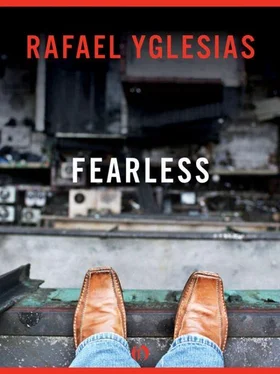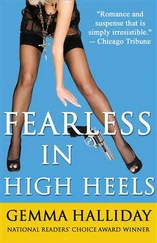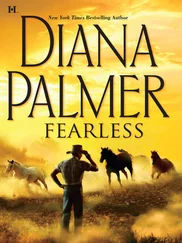“Ooops, I’d better shut up,” that voice concluded and the room chuckled.
“Not really,” Perlman said to the group. “I want you all to talk. But me first.” He smiled and leaned forward eagerly. “You all had a very special experience. I know that sounds funny. It wasn’t good, but that doesn’t make it any less special. You can talk to lots of people about it, you should talk to lots of people about it, but only the people in this room will really hear and understand all of what you have to say. I know it can be tough to stand up and talk to a large group of people. And, of course, you don’t have to say anything at all. You can just listen. There are no rules except that nothing anybody says is going to be repeated outside this place unless they want it to be. You don’t have to be interesting, you don’t have to be funny, you don’t have to be nice, you don’t have to make sense. I know some of you have become friends and shared your feelings with each other but that’s not what this is. That’s the way we handle most bad things that happen in life. We talk with family and friends and maybe ministers or priests or rabbis or shrinks. But that’s not what this is. What we’re doing here today is something as old as humankind itself.” Perlman leaned back and looked up at the ceiling. “Before we made all these machines and people spread out into what we call the nuclear family, human beings lived in tribes. White, black, yellow. We lived in tribes. And when a tribe suffered a calamity, a great flood, an exploding mountain, a terrible shaking of the earth, they sat around their fires, under the skies or huddled in caves, and retold the event, the stories of deaths and destruction, of escape and rescue. I’m not sure why that helps us. We’re still just people, I guess. We haven’t invented a new human being to go with all the new machines. I have a lot of theories about why this group talking helps, but they could be wrong. What’s important is that it helps.” Perlman sighed and lowered his eyes, briefly scanning the circle of faces. “If there’s anyone who wants to stand up and say what happened to them we’d like to hear it.”
Carla did want to hear. She was afraid she would have to talk, but she wanted to listen. She searched for a familiar face. The man who had lost his arm. No. Lisa the flight attendant. No. There was no one she remembered. Maybe these were the wrong survivors.
“I lost my sister,” a woman said. “I lost my sister and my niece and my nephew.”
“Could you stand up?” Perlman asked mildly.
She had blond hair and a deep tan. She wore jeans and a T-shirt. She looked athletic and pretty. To Carla she was the sort of Midwestern American woman who had been a cheerleader in high school. While continuing to speak in a strong clear voice, she stood up: “I was sitting right next to them. Their seats were ripped away. Right in front of my eyes. I’ll never forget it. My sister just—” she gestured into the air, miming something moving off, hovering away, out of reach. “My kids—” she resumed, “my two boys, were on the other side of me. They’re okay — I wish I’d brought them. My mother said no.”
Somebody laughed for a moment and then swallowed it, embarrassed.
The blonde answered the laugh: “Well, she thought it would make it worse for them to relive it. I don’t know how to explain to her you can’t stop — you can’t stop reliving—” Without warning she was weeping. She choked on the tears and doubled up, covering her face with her hands. The people seated on either side of her reached out to support her. A man got up to guide her back to her seat.
Perlman spoke sharply at the blonde: “What’s your name?”
The man trying to help her back to her seat said, “What!” to Perlman as if he were mad.
By now the blonde had forced her tears down. She straightened and looked at Perlman, puzzled.
“Could you say your name, just your first name, and then finish telling your story?” He added quickly to the man supporting her. “You can sit. She’s all right.”
The woman collected herself. She rubbed her forehead. “ Uh,” she seemed to be concentrating. “I’m, uh, I’m — everybody calls me Jackie,” she flashed a shy smile.
“Why don’t you tell us about the crash, Jackie, or even about things that happened before anything went wrong? We don’t just want to know who lived and died. We want to know everything. Tell us from the beginning. Tell it all the way through.”
“Jesus,” a man in Carla’s row mumbled. He stood up and addressed Perlman. “This is going to take forever. I can’t stay. I’ve got to get back to work.”
“What’s your name?” Perlman asked.
“I’m John Wilkenson.”
“Why were you flying that day, John?”
“Pardon me?” Wilkenson had on a gray double-breasted suit. He buttoned the inner flap of the jacket as if preparing to leave.
“What were you flying to Los Angeles for?” Perlman asked.
“I was going on business.” Wilkenson spoke matter-of-factly.
At this answer Perlman tilted his big head. He resembled a quizzical dog wondering if what had been put in his dish was food. He said softly: “You must be very committed to your work.”
John Wilkenson sat down as abruptly as he had stood up. “I’ll wait,” he said from his chair.
It was comical, but no one laughed. “Go ahead, Jackie,” Perlman said.
Jackie told her story. She, her sister and their kids were flying together to visit with their brother in Los Angeles. They planned to see Disneyland. It was the first time all the siblings would have been together since they were teenagers. “Now we’ll never be together again,” she pointed out. Perlman got her attention again with a sharp question and she went on calmly. Carla understood that his behavior was a technique, although she thought it was tricky and unfair.
If listening to other people’s tragedies was supposed to make Carla feel better, then Perlman’s group wasn’t working. Jackie had none of Carla’s problems. From what she said, going outside didn’t scare her, her husband was great to her, and she and her kids had never been closer. Perlman didn’t seem to appreciate Jackie’s easy adjustment either. He interrupted her and said, “Let’s just talk about things that happened the day of the crash. You said you saw your sister and her kids go flying off. What happened to you?”
“I don’t know. I guess I closed my eyes and then there was incredible noise and I couldn’t see anything. I was choking on the smoke and I heard that man — is he here? Are you here?” Jackie asked the crowd.
“Who?” Perlman asked.
“Max Klein. Newstime called him the Good Samaritan. I heard him shouting, ‘This way! Follow me!’ And he was standing—” She stopped talking. Carla knew why. Jackie was remembering the bodies she had passed on the way out: a fast look at the crazy-looking dead, at smashed and mutilated bodies. Jackie came to: “Is he here?” she asked Perlman.
“No, he couldn’t come,” Perlman said quickly.
“I couldn’t see anything but him. I only knew my sons were with me ’cause I was holding onto them. That man saved our lives. I came hoping to thank him.”
“How did he save your life?” Perlman asked.
“I was so scared. I couldn’t see. And he sounded so normal. ‘Follow me.’ ” Jackie imitated the call and the way the Good Samaritan had raised his hand and waved. “So I went that way even though I couldn’t tell what was the right direction. Then there was this light behind him. I didn’t know if it was the flames. He disappeared into it. I could still hear him. ‘We’re alive!’ he kept saying and so I wasn’t scared. I took my kids in my arms and jumped into the yellow light. It was the sun shining through the smoke. We landed on the corn and we were okay. I was so scared, my kids were screaming, the smoke was everywhere. We might’ve gone the wrong way and choked on the smoke. I came here today mostly because I wanted to thank him.”
Читать дальше












